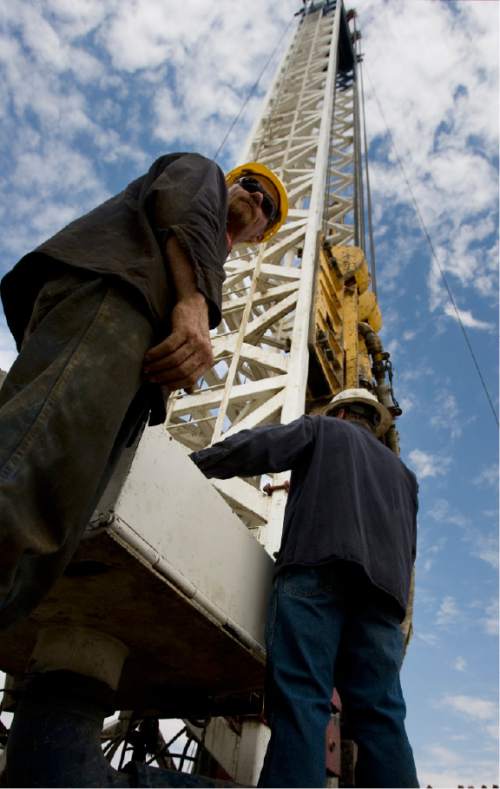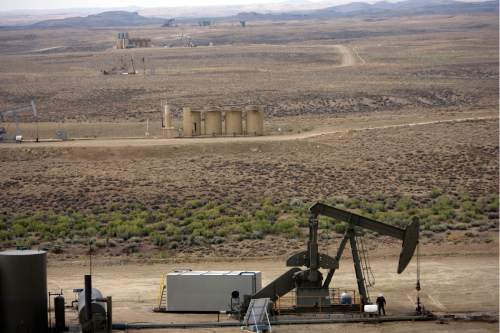This is an archived article that was published on sltrib.com in 2015, and information in the article may be outdated. It is provided only for personal research purposes and may not be reprinted.
Back in the early 1990s, a small energy firm called Sego Resources acquired 17 federal oil and gas leases in wilderness-quality terrain near Utah's Desolation Canyon.
Such leases are supposed to expire if the operators fail to coax hydrocarbons out of the ground in paying quantities within 10 years.
But Sego's 17 leases remain in a kind of indefinite limbo, critics charge, because the Bureau of Land Management is too willing to grant lease "suspensions" and too under-resourced to enforce the terms of these suspensions. So the lands sit unused, untouchable by the public or other companies.
In a report released this week, The Wilderness Society (TWS) documented that lease suspensions affect 3.25 million acres — 10 percent of all public land in the U.S. under lease for oil and gas development. Utah accounts for about 30 percent of these suspended leases: 645, covering 929,510 acres out of about 3.5 million under lease.
"This misuse of a sometimes necessary tool is creating a number of problems and cheating taxpayers out of millions of dollars," says Nada Culver, director of agency policy for TWS. "We are not allowing someone else to develop it, nor are we allowing the land to be managed for conservation or recreation."
Meanwhile, industry's allies in Congress complain the BLM is not issuing leases fast enough.
"Production of our nation's mineral resources on federal lands has provided security and stability — an increasing priority in these troubled times. However, the current leasing trend calls into question whether future generations will be able to meet their needs of energy security. Indeed, since 2008, the goal amount of leased acreage has fallen by 12.6 million," stated a Dec. 16 letter to the Department of the Interior.
The missive is signed by Utah's Rep. Rob Bishop, who chairs the House Natural Resources Committee, and several other House members, including Utah Reps. Chris Stewart and Jason Chaffetz. The congressmen's ire was provoked by recent BLM decisions to postpone lease sales in the face of increasing activism opposing all fossil-fuel leasing on federal lands.
Environmental advocates were quick to point out that industry is sitting on thousands of federal leases and low energy prices have depressed the market for new leases and for developing existing ones.
Overall, 20 million acres of leases are not being developed, and industry currently holds 6,000 unused drilling permits, according to the TWS report. Environmentalists cite such data to urge BLM against issuing new leases in sensitive areas.
"Companies are simply not submitting applications to drill for oil in public lands, because they cannot sell oil at a profitable price. In fact, the BLM recently canceled sales in New Mexico and Montana for exactly this reason," wrote Sally Hardin of the Western Values Project in a rebuttal to the Bishop letter.
Critics contend the BLM has allowed lease suspensions to become unwarranted giveaways to the oil and gas industry. Operators can sit on leases indefinitely, stockpiling them at the expense of taxpayers.
There are valid reasons for granting suspensions, such as lawsuits or the need to analyze a drilling program. Operators should not be punished for conditions that are beyond their control, the BLM says.
But the reason for the Sego suspensions is a controversial one among environmentalists: The company was not able to lease adjacent lands.
"We've heard from the Vernal field office, 'We do it for customer services.' That's a pretty myopic view. It's not BLM's job to hold industry's hand and help them develop these lands," says Steve Bloch, legal director for the Southern Utah Wilderness Alliance.
During the 1990s, Sego "nominated" parcels surrounding its leases near Desolation, an area that did not have much development, but BLM declined to offer them for lease, according to Kent Hoffman, the BLM's deputy director over minerals for Utah. With the term expiration nearing, BLM agreed to suspend Sego's 17 leases, citing a policy intended to promote "logical exploration and development."
According to the 1999 letter granting the company's request, these parcels' suspension was to lift one year after adjacent parcels were offered in a competitive lease sale.
For at least six of the Sego leases, now controlled by much larger companies with experience drilling the Uinta Basin, the grounds for relief haven't existed for a decade, and the leases are now invalid as a matter of law, says SUWA staff attorney Landon Newell.
But Hoffman contends SUWA may have itself to blame for filing litigation that resulted in the suspension of the surrounding leases, which were offered in 2005.
"The company had only six months of actual time when the new leases were in place, so the one-year trigger was never reached," Hoffman says. "If a company is trying through the nomination process to obtain a big enough area to justify a drilling program and BLM declines leasing, that's beyond their control."
Newell counters that all too often, operators wait until the eleventh hour to file a drill application, or seek an adjacent lands suspension without ever publicly documenting which leases they want and why they need them. Then the BLM fails to monitor the suspensions, and the clock never resumes ticking on the lease.
"This system is just one more example of oil and gas companies running the show on our public lands without enough oversight from the government or the public," the TWS report states. Even more troubling is that leaseholders are often not required to pay annual rent, usually at $2 per acre, while leases are under suspension.
All but 20 of Utah's suspended federal leases are excused from paying rent, representing about $1.7 million in lost revenue. Half the rents, as with bonuses determined at auction and royalties, go to the state, which distributes these revenues to local governments.
Brian Maffly covers public lands for The Salt Lake Tribune. Maffly can be reached at bmaffly@sltrib.com or 801-257-8713
Twitter: @brian_maffly







